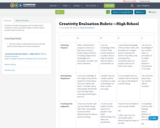
A rubric in student language used by high school students to self-assess their ability to decide which creative ideas to work on.
- Subject:
- Arts and Humanities
- Material Type:
- Assessment
- Date Added:
- 06/28/2017

A rubric in student language used by high school students to self-assess their ability to decide which creative ideas to work on.
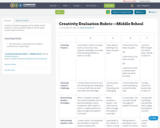
A rubric in student language used by middle school students to self-assess their ability to decide which creative ideas to work on.
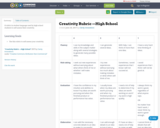
A rubric in student language used by high school students to self-assess their creativity.
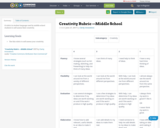
A rubric in student language used by middle school students to self-assess their creativity.

In this video author Patrick Gale shares his thoughts on madness and creativity during the Madness and Literature Network Seminar in 2009. For related videocasts see those presented by Professor Paul Crawford and Paul Sayer.
Presentation delivered May 2009.
Suitable for: Undergraduate study and Community Education
Patrick Gale, Author.
Patrick Gale was born on the Isle of Wight in 1962, where his father was prison governor at Camp Hill prison. Later the family moved to London. He boarded at The Pilgrim's School, where he was a chorister, then went to Winchester College before reading English at Oxford University. He did a series of odd jobs to support his writing before becoming a full-time novelist, moving to Cornwall in 1987. He is the author of several novels, and also writes short stories and novellas. He has written one book of non-fiction, on the American novelist Armistead Maupin, and also writes book reviews for The Daily Telegraph.
His first two novels, Ease and The Aerodynamics of Pork, were published on the same day in 1986. The Facts of Life (1995) tells the story of Edward Pepper, an exile saved from Nazi Germany in the Kindertransport, and Tree Surgery for Beginners (1998) is about Laurence Frost, an inarticulate tree surgeon. A Sweet Obscurity (2003) is told from the alternating viewpoints of four separate characters. Friendly Fire (2003) draws on the author's own experience of a late 1970s adolescence, and Notes from an Exhibition (2007) is set in Cornwall, exploring the effects of mental illness on artist Rachel Kelly and her family.
Important Copyright Information:
You are free to copy, distribute and transmit this video as long as you credit the original author. The video is also available on YouTube
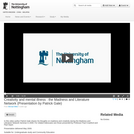
In this video author Patrick Gale shares his thoughts on madness and creativity during the Madness and Literature Network Seminar in 2009. For related videocasts see those presented by Professor Paul Crawford and Paul Sayer.
Presentation delivered May 2009.
Suitable for: Undergraduate study and Community Education
Patrick Gale, Author.
Patrick Gale was born on the Isle of Wight in 1962, where his father was prison governor at Camp Hill prison. Later the family moved to London. He boarded at The Pilgrim's School, where he was a chorister, then went to Winchester College before reading English at Oxford University. He did a series of odd jobs to support his writing before becoming a full-time novelist, moving to Cornwall in 1987. He is the author of several novels, and also writes short stories and novellas. He has written one book of non-fiction, on the American novelist Armistead Maupin, and also writes book reviews for The Daily Telegraph.
His first two novels, Ease and The Aerodynamics of Pork, were published on the same day in 1986. The Facts of Life (1995) tells the story of Edward Pepper, an exile saved from Nazi Germany in the Kindertransport, and Tree Surgery for Beginners (1998) is about Laurence Frost, an inarticulate tree surgeon. A Sweet Obscurity (2003) is told from the alternating viewpoints of four separate characters. Friendly Fire (2003) draws on the author's own experience of a late 1970s adolescence, and Notes from an Exhibition (2007) is set in Cornwall, exploring the effects of mental illness on artist Rachel Kelly and her family.
Important Copyright Information:
You are free to copy, distribute and transmit this video as long as you credit the original author. The video is also available on YouTube
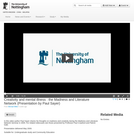
In this video author Paul Sayer shares his thoughts on madness and creativity during the Madness and Literature Network Seminar in 2009. For related videocasts see those presented by Professor Paul Crawford and Patrick Gale.
Presentation delivered May 2009.
Suitable for: Undergraduate study and Community Education
Paul Sayer, Author.
Paul Sayer is a former psychiatric nurse whose first novel The Comforts of Madness (1988) won the Constable Trophy, the Whitbread First Novel prize, and the Whitbread Book of the Year award. His five subsequent books include The Absolution Game (1992), Booker Prize 'long-listed', and Men in Rage (1999) published by Bloomsbury. His work has been translated into ten languages, and he has been the recipient of a number of scholarships, including a Society of Authors travel award and, for 2007/8, a Wingate Scholarship to support the writing of a new novel.
Paul has tutored for Arvon, and has numerous credits for reviews and features in: the Sunday Times, Times, Independent, Literary Review, Time Out, Nursing Standard, Nursing Times, and many more. Psychiatry and psychological sciences remain an interest.
'The Comforts of Madness is surely sad, but enthralling in its excellence. Sayer's style is understated and surehanded.'- New York Newsday
Important Copyright Information:
You are free to copy, distribute and transmit this video as long as you credit the original author. The video is also available on YouTube
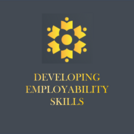
The limited series of podcasts including downloadable documents are meant for teachers teaching internally displaced learners 13 to 19 years of age. The modules titled Education and Employment, Health and Wellness, Preserving Environment and Self-employment make the teachers aware of skills in demand, employment avenues, and strategies that can be adopted by teachers. You can listen to the episodes on OER Commons, Spotify, Apple, Google, and Stitcher.
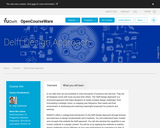
In our daily lives we use hundreds or even thousands of products and services. They are all designed, some with more success than others. The ‘Delft Design Approach’ is a structured approach that helps designers to tackle complex design challenges: from formulating a strategic vision, to mapping user behaviors, their needs and their environment, to developing and selecting meaningful proposals for products and services.
DDA691x offers a college-level introduction to the Delft Design Approach through lectures and exercises on design fundamentals and 6 methods. You will understand basic models and concepts that underlie the Delft approach. You will also develop the capability to use 6 basic methods in a design context. You will do so by applying the methods to realistic design challenges and by reflecting on your own performance by comparing it to that of expert designers as well as through peer discussion.

This course examines the role of the engineer as patent expert and as technical witness in court and patent interference and related proceedings. It discusses the rights and obligations of engineers in connection with educational institutions, government, and large and small businesses. It compares various manners of transplanting inventions into business operations, including development of New England and other U.S. electronics and biotechnology industries and their different types of institutions. The course also considers American systems of incentive to creativity apart from the patent laws in the atomic energy and space fields.
Acknowledgment
The instructors would like to thank Joanne Rines and Elijah Ercolino for their efforts in preparing this course.
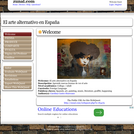
This WebQuest has a double focus, spanish language and Spanish Art content. It aims at making students reflect on the very nature of art taking examples from Spanish contemporary art, and also at improving Spanish language skills and art vocabulary. It promotes creativity, critical thinking, cooperative learning and uses web 2.0. tools.
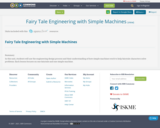
In this unit, students will use the engineering design process and their understanding of how simple machines work to help fairytale characters solve problems. Each lesson focuses on one fairytale and one simple machine.

This course is a seminar on creativity in art, science, and technology. We discuss how these pursuits are jointly dependent on affective as well as cognitive elements in human nature. We study feeling and imagination in relation to principles of idealization, consummation, and the aesthetic values that give meaning to science and technology as well as literature and the other arts. Readings in philosophy, psychology, and literature are part of the course.

The purpose of Design Dilemma is to encourage students to use resourceful and creative behaviors to think like a scientist. Students will demonstrate these behaviors to design and build a suitable structure for a fourth little pig. Although the use of the book The Fourth Little Pig is helpful, the module may be taught without it. This module is meant for all students. The classroom teacher should work with a specialist or special educator to find or develop alternate activities or resources for visually impaired students, where appropriate.
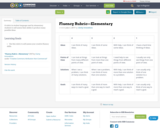
A rubric in student language used by elementary students to self-assess their ability to produce many possible ideas.
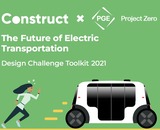
In the Future of Electric Transportation Design Challenge - a soup-to-nuts curriculum toolkit from Construct - you'll ask young people to find new and novel ways to increase use & equitable access to electric vehicles.
This comprehensive toolkit is intended for classroom teachers and other educators interested in running a multi-week or full-term design challenge with students. The guide is written with 8th-9th graders as a target grade level, however this curriculum could easily be adapted for both older and younger students: 5th-12th grade.
An optional feature in this challenge experience is to have students submit their design briefs (anonymously from their teacher) for the opportunity to be recognized by Construct and Industry Leaders interested in their concepts!
A teacher running this Transportation Design Challenge could connect it to multiple standards at multiple grade-levels in multiple subject areas.
Construct has facilitated several cohort-based challenges for middle and high school students, using this toolkit, and we are excited to be able to provide this curriculum at no charge to any interested teachers.
We are happy to answer any questions - you can reach us at info@constructlearns.org. We also offer additional coaching support.
Please download this Challenge and share it with your colleagues! If you opt to run the Challenge in your classroom, we do hope you'll reach back and let us know how it worked for YOU! With your feedback, we'll keep iterating and improving and work to make this a user-friendly, joy-provoking, flexible, rigorous, effective, skills-building and FUN curriculum toolkit for you and your students.

This video has 100 Prompts for your students or participants to come up with 100 different ideas. You should ask each student to grab a pen & paper (ideally post-its) and have a different piece of paper for each idea. This video can be used to kick-off the Ideation State of Design Thinking (or any Ideation Session), using Brainwriting. I have used for both in-person and live-online education at University College Dublin.
I usually use 10 prompts in class - get a student to pick a number between 1 and 9 inclusive and then use the Chapters below the video to play from that number (e.g. someone shouts out seven so I play from 71)
Brainwriting is a solo exercise - write down all your ideas and THEN share with others before coming up with even more ideas. Research shows that this hybrid-approach (of generating ideas alone first, and then sharing with a team) works best. "Groups organized in the hybrid structure are able to generate more ideas, to generate better ideas, and to better discern the quality of the ideas they generate" (Girotra et al, 2010)

Firms must develop major innovations to prosper, but they don't know how to. However, recent research into the innovation process has made it possible to develop breakthroughs systematically. 15.356 How to Develop Breakthrough Products and Services explores several practical idea generation development methods. To convey the art required to implement each of these methodologies, experts are invited to present real cases to the class.

To prosper, firms must develop major product and service innovations. Often, though, they don't know how. Recent research into the innovation process has made it possible to develop "breakthroughs" systematically. 15.356 presents several practical concept development methods, such as the "Lead User Method," where manufacturers learn from innovative customers. Expert guest speakers present case studies that show the "art" required to implement a concept development method. 15.356 is a half-term subject.
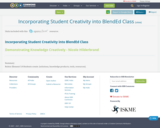
Rubric Element 1.8
Students create. (solutions, knowledge products, tools, resources).